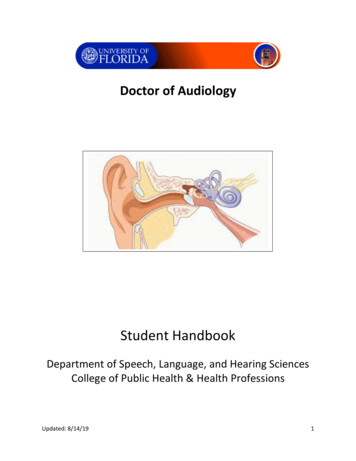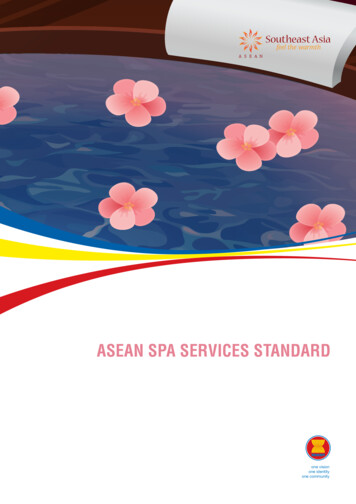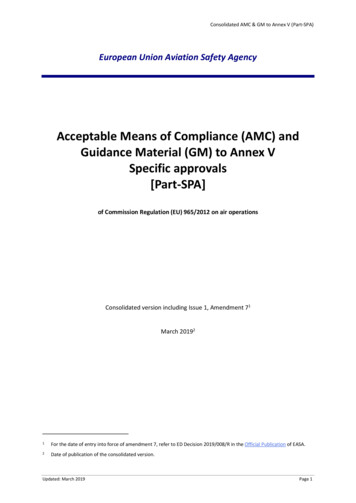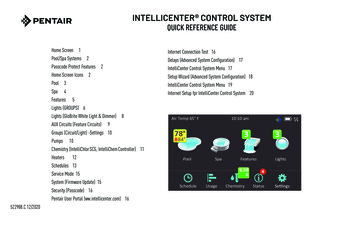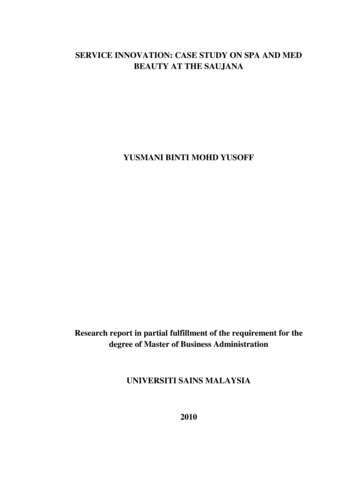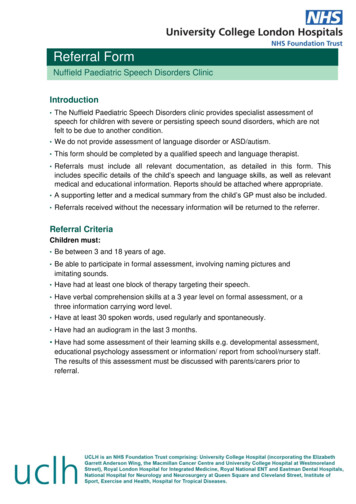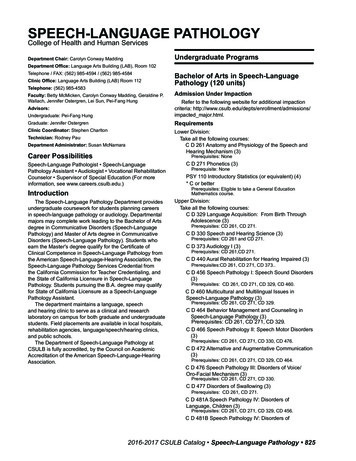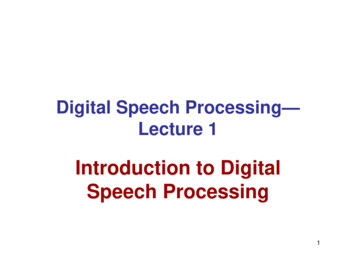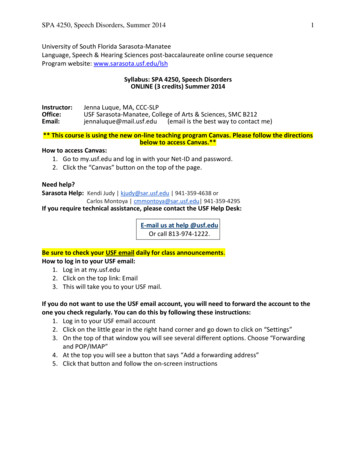
Transcription
SPA 4250, Speech Disorders, Summer 20141University of South Florida Sarasota-ManateeLanguage, Speech & Hearing Sciences post-baccalaureate online course sequenceProgram website: www.sarasota.usf.edu/lshSyllabus: SPA 4250, Speech DisordersONLINE (3 credits) Summer 2014Instructor:Office:Email:Jenna Luque, MA, CCC-SLPUSF Sarasota-Manatee, College of Arts & Sciences, SMC B212jennaluque@mail.usf.edu(email is the best way to contact me)** This course is using the new on-line teaching program Canvas. Please follow the directionsbelow to access Canvas.**How to access Canvas:1. Go to my.usf.edu and log in with your Net-ID and password.2. Click the “Canvas” button on the top of the page.Need help?Sarasota Help: Kendi Judy kjudy@sar.usf.edu 941-359-4638 orCarlos Montoya cmmontoya@sar.usf.edu 941-359-4295If you require technical assistance, please contact the USF Help Desk:E-mail us at help @usf.eduOr call 813-974-1222.Be sure to check your USF email daily for class announcements.How to log in to your USF email:1. Log in at my.usf.edu2. Click on the top link: Email3. This will take you to your USF mail.If you do not want to use the USF email account, you will need to forward the account to theone you check regularly. You can do this by following these instructions:1. Log in to your USF email account2. Click on the little gear in the right hand corner and go down to click on “Settings”3. On the top of that window you will see several different options. Choose “Forwardingand POP/IMAP”4. At the top you will see a button that says “Add a forwarding address”5. Click that button and follow the on-screen instructions
SPA 4250, Speech Disorders, Summer 20142PROGRAM MISSION STATEMENTThe mission of the LSH post-baccalaureate online course sequence is to prepare students withdegrees in other fields to apply for Masters Degree programs in speech-language pathology.This preparation includes the acquisition of foundational concepts of language, speech, andhearing sciences as well as the advancement of critical thinking and problem-solving skills thatwill serve students both in graduate school and as future speech-language pathologists.USFSM BACHELOR OF SCIENCE IN SPEECH-LANGUAGE SCIENCES STUDENT LEARNINGOUTCOMES1. Evaluation: Students will be familiar with the methods used in the evaluation ofcommunication disorders and differences at a level appropriate for the position of SpeechLanguage Pathology Assistant. These include knowledge of basic human communication andswallowing processes, including their biological, neurological, acoustic, psychological,developmental, and linguistic and cultural bases. These discipline specific skills are guided byASHA Knowledge and Skills Acquisition (KASA) published standards.2. Treatment: Students will be familiar with treatment of communication disorders at alevel appropriate for the position of Speech-Language Pathology Assistant. These includeknowledge of basic human communication and swallowing processes, including their biological,neurological, acoustic, psychological, developmental, and linguistic and cultural bases. Thesediscipline specific skills are guided by ASHA Knowledge and Skills Acquisition (KASA) publishedstandards.3. Ethics: Students will demonstrate knowledge of professional conduct and scope ofpractice at a level appropriate for the position of Speech-Language Pathology Assistant.4. Critical Thinking: Students will demonstrate critical thinking skills, including the abilityto engage in inductive and deductive reasoning.5. Written Communication: Students will demonstrate written communication skills bywriting clear and persuasive texts that include correctly applied professional language.COURSE DESCRIPTIONThis course will provide an overview of the mechanisms involved in speech production, and willreview the nature and impact of speech sound disorders, fluency disorders, voice, and motorspeech disorders.COURSE OBJECTIVES AND LEARNING OUTCOMES:The student will demonstrate:1) Foundational knowledge of the mechanisms involved in (normal) speech production –including linguistic, motor, and cognitive mechanisms and the developmental course ofspeech production, from birth through adulthood.2) Basic knowledge of the primary symptoms of speech sound, fluency, voice andresonance, and motor speech disorders.3) Understanding of the human dimensions and impact of speech disorders on socialcommunicative functioning.4) The ability to analyze, integrate, and apply foundational concepts about speechdisorders in oral, written, and constructive (hands-on) modalities.
SPA 4250, Speech Disorders, Summer 20143ASHA KNOWLEDGE AND SKILLS ACQUISITION (KASA) STANDARDS TO BE ACHIEVED:KASA STANDARDMECHANISM FOR LEARNINGASSESSMENTIII-B Class lectures Formative: ClassDemonstrate knowledge of basic human Class discussions anddiscussions,communication processes, including their demonstration/modelingdemonstrations, andbiological, neurological, acoustic, Power point, DVD/CDprojectspsychological, developmental, linguisticpresentations Summative: Exam I,and cultural bases Canvas documentsII, IIIIII-C Class lectures Formative: ClassDemonstrate knowledge of the nature of Class discussions anddiscussions,speech, language, hearing anddemonstration/modelingdemonstrations, andcommunications disorders and Power point , DVD/CDprojectsdifferences including their etiologies,presentations Summative: Exam I,characteristics, anatomical/physiological, Canvas documentsII, IIIacoustic, psychological, developmental,and linguistic and cultural correlates.Specific knowledge will be demonstratedin the following areas:Articulation, receptive and expressivelanguage(phonology, morphology, syntax,semantics, pragmatics), normal anddisordered fluency in speaking, normaland disordered voice and resonancecharacteristics, listening, reading, writing,and manual modalities, hearing includingthe impact on speech and language,cognitive aspects of communication(attention, memory, sequencing, problemsolving, executive functioning), socialaspects of communication, (includingchallenging behavior, ineffective socialskills, lack of communicationopportunities)III-DPossess knowledge of the principles andmethods of prevention, assessment, andintervention for people withcommunication disorders, includingconsideration ofanatomical/physiological, psychological,developmental and linguistic and culturalcorrelates of the disorders. Class lectures Class discussions anddemonstration/modeling Power point, DVD/CDpresentations Canvas documents Formative: Classdiscussions,demonstrations, andprojects Summative: Exam I,II, III,
SPA 4250, Speech Disorders, Summer 20144III-EPossess knowledge of standards of ethicalconduct Review of ASHA code ofEthics Class discussion anddemonstration/modelingIII-FPossess knowledge of the processes usedin research and the integration ofresearch principles into evidence-basedclinical practice Class lectures Class discussions anddemonstration/modeling Power point presentations Canvas documents Formative: Classdiscussions,demonstrations, andprojects Summative: Exam I,II, III, Formative: Classdiscussions,demonstrations, andprojects Summative: Exam I,II, III,REQUIRED TEXTBOOKSNoneOTHER READINGSOther required readings will be posted on Canvas in the weekly course modules.E-MAIL PROCEDURESThere are three ways to contact me with course or personal questions:1. While in Canvas, click on the “Help” link in the top right corner of the page. Your firstoption after clicking this link says “Ask your instructor a question.” Click this option andfollow the on-screen prompts to message me through Canvas.2. Send an email to jennaluque@mail.usf.edu. If you choose to use this method, please putyour course AND SECTION in the subject line so I know which course you are in (I’mteaching 2 courses). If you are having an urgent issue, please put URGENT in the subjectline as well.3. Post a question to the Question and Answer discussion board. This is best to do if youhave a general course question. Once you are in Canvas, select “Discussions” from theleft hand menu bar. Then click on the discussion “Questions and Answers.” Finally, clickin the “Reply” box and type your question or response.No matter how you choose to contact me, please allow 24 hours for a response, Mondaythrough Friday. Responses may take a little longer during the weekend and on holidays.COURSE FORMATThis course is 100% online and is designed to be an interactive experience. Course material willbe presented in an asynchronous format. This means that you will have readings, assignments,lectures and supplementary materials that will be posted in weekly modules on Canvas.Lectures are intended to clarify reading and highlight important concepts.
SPA 4250, Speech Disorders, Summer 20145DUE DATESThe schedule below is based on a Monday-Sunday week. Unless otherwise specified, all work isdue (must be submitted via Canvas) by 11:59 pm EST on Sunday at the end of the given week.Penalty for late submissions and incorrect format: Any assignment submitted past 11:59 PMEST on the due date indicated will be penalized by 10% of the total possible points per day lateup to a maximum of 3 days. For example, a 10 point assignment would lose one point the firstday it was late, 2 points the second day it was late, 3 points the third, etc. NOTE: Be sure yourassignments are correctly uploaded via Canvas. “Empty” assignments (i.e. submission withoutattachment) will be considered LATE and points will be deducted accordingly.Submissions that are not in the requested file format (e.g., .pdf, docx, .jpg) will be deducted10% and must be resubmitted within 24 hours of my request. If resubmission is beyond 24hours of request, late penalties (see above) will apply. Request for resubmission may be viaemail or comment in your grades.COURSE REQUIREMENTS:1. EXAMINATIONS (300 points)There will be three (3) examinations required. The exams will be non-cumulative in nature andwill assess knowledge and skills attained through the weekly modules. Each exam will be worth100 points. You will complete the exams on-line, and they will be available in the weeklymodule in Canvas. Identical to the on-line quizzes, exams one and two will be available fromMonday-Sunday of the week they are assigned.The final exam will only be available from Monday-Friday of the final week of class since gradesneed to be submitted by the following Tuesday.You will only have one opportunity to complete the exams. You will have one hour and fifteenminutes to complete the exam. These exams have all been given in face-to-face classes wherestudents only have one hour and fifteen minutes to complete them. Therefore, I am confidentthat you should be able to complete the exams in this time frame if you are not using yournotes or book. **At the end of the allotted time, the exam will not force you out, but it willsend me a message that you went over time. If this happens to you, please finish the exam andthen email me an explanation about why you went over time. Whether or not I will deductpoints is at my discretion on an individual basis.2. Quizzes (70 points)You will have seven (7) quizzes to complete located in the weekly modules in Canvas. Thequizzes are designed to test your knowledge of the material presented that week and toprovide practice with applying concepts you learn in class. Each quiz is set up so that it must becompleted within a week and you will be given unlimited tries at each quiz so that you can learnfrom your mistakes. Quizzes can only be accessed for 1 week. Once the time for that quiz haspassed, you cannot access that assignment. There will be no make-up quizzes. Each quiz will be
SPA 4250, Speech Disorders, Summer 20146worth 10 points. You can earn a total of 70 points on these quizzes. You will receive 0 points foreach quiz that you miss.3. Assignments (70 points)Each week you will need to complete an assignment designed to help you practice applying theinformation you learn during the weekly module. Each assignment will be worth 10 points.These assignments will be posted in the Module with instructions and a rubric. Be sure tofollow the rubric closely so you do not lose points. You will submit all assignments using thelinks provided in the weekly modules in Canvas.5. Discussion Posts (35 points)Each week you will be asked to post your answer to a discussion question. You will find thediscussion link in the weekly module. There will also be a rubric for each discussion post. Youwill receive 3 points for a complete, on-time response.Additionally, you must choose one post from a classmate to which you will respond. Theresponse can include corrections if you think someone’s answer is incorrect or you may want toshare your opinion on something they said. The most important thing to remember is that youMUST add something to the post. In other words, you will not receive points for simply saying,“good job,” or, “I agree.” You will receive 2 points for each weekly response.Your grade will be based on the following:Seven (7) QuizzesThree (3) TestsSeven (7) AssignmentsSeven (7) Discussion PostsTOTAL70 points300 points70 points35 points475 pointsThe following is the grading scale to be used:GradeA AAC GradeB BBD AST DAY TO WITHDRAWL WITHOUT ACADEMIC PENALTY: June 28, 2014 (NO REFUND).
SPA 4250, Speech Disorders, Summer 20147USF Sarasota-Manatee Policies and ProceduresAcademic DishonestyThe University considers any form of plagiarism or cheating on exams, projects, or papers to beunacceptable behavior. Please be sure to review the university’s policy in the USFSMUndergraduate Catalog or USFSM Graduate Catalog and the USF Student Code of f.edu/Academics/Catalogs/USF Student Code of Conduct:http://www.sa.usf.edu/srr/page.asp?id 88Academic DisruptionThe University does not tolerate behavior that disrupts the learning process. The policy foraddressing academic disruption is included with Academic Dishonesty in the USFSMUndergraduate Catalog or USFSM Graduate Catalog and the USF Student Code of f.edu/Academics/Catalogs/USF Student Code of Conduct:http://www.sa.usf.edu/srr/page.asp?id 88Contingency PlansIn the event of an emergency, it may be necessary for USFSM to suspend normal operations.During this time, USFSM may opt to continue delivery of instruction through methods thatinclude but are not limited to: Canvas, Elluminate, Skype, and email messaging and/or analternate schedule. It’s the responsibility of the student to monitor Canvas site for each classfor course specific communication, and the main USFSM and College websites, emails, andMoBull messages for important general information. The USF hotline at 1 (800) 992-4231 isupdated with pre-recorded information during an emergency.Disabilities AccommodationStudents are responsible for registering with the Office of Students with Disabilities Services(SDS) in order to receive academic accommodations. Reasonable notice must be given to theSDS office (typically 5 working days) for accommodations to be arranged. It is the responsibilityof the student to provide each instructor with a copy of the official Memo of Accommodation.Contact Information: Disability Coordinator: 359-4714; email: disabilityservices@sar.usf.eduand website: http://www.usfsm.edu/students/disability/Fire Alarm InstructionsAt the beginning of each semester please note the emergency exit maps posted in eachclassroom. These signs are marked with the primary evacuation route (red) and secondaryevacuation route (orange) in case the building needs to be evacuated. See EmergencyEvacuation Procedures.Religious ObservancesThe University recognizes the right of students and faculty to observe major religious holidays.Students who anticipate the necessity of being absent from class for a major religious
SPA 4250, Speech Disorders, Summer 20148observance must provide notice of the date(s) to the instructor, in writing, by the second weekof classes. res/pdfs/policy-10-045.pdfEmergency PreparednessIt is strongly recommended that you become familiar with the USF Sarasota-ManateeEmergency Action Plan on the Safety Preparedness reparedness.phpWeb Portal InformationEvery newly enrolled USF student receives an official USF e-mail account. Students receiveofficial USF correspondence and Canvas course information via that address. Therefore it is thestudent’s responsibility to check their USF email regularly.Instructor CopyrightStudents may not sell notes or other course materials.
SPA 4250, Speech Disorders, Summer 2014DatesWeek 15/12-5/18Week 25/19-5/259TENTATIVE COURSE OUTLINELecturesAssigned readingCourse IntroductionAnatomy & Physiology for ArticulationIntroduction to PhonologyPhonological DevelopmentBauman-Waengler, J. (2009).Phonological TheoriesCh. 8. pgs. 236-256.Articulation DisordersArticulation Diagnosis and Treatment To Skim:Bauman-Waengler, J. (2009).Ch. 8. pgs. 256-280.Bauman-Waengler, J. (2008).Ch. 10. pgs. 361-377.Week 35/26-6/1Week 46/2-6/8Week 56/9-6/15Week 66/16-6/22Week 76/23-6/29Week 86/30-7/6Week 97/7-7/13Week 107/14-7/19EXAM 1: Articulation and PhonologyIntroduction to Vocal DisordersAnatomy and Physiology for VoiceVoice Disorders: Types, Evaluation, and Boone, D.R. et. al. (2005). pgs.Treatment51-92.Guide to Vocology.EXAM 2: Vocal DisordersNeuro IntroductionApraxia: Evaluation, Diagnosis, andTreatmentNeuro Ch. 13 pgs. 602-618To SkimNeuro Ch. 1Dysarthria: Evaluation, Diagnosis, and Neuro Ch. 13 pgs. 618-660TreatmentFluency: Evaluation, Diagnosis, and Owens, Metz, and FarinellaTreatment(2011). pgs. 235-257EXAM 3: Apraxia, Dysarthria, and Fluency
1. Go to my.usf.edu and log in with your Net-ID and password. 2. Click the "Canvas" button on the top of the page. Need help? Sarasota Help: Kendi Judy kjudy@sar.usf.edu 941 -359 4638 or Carlos Montoya cmmontoya@sar.usf.edu 941-359-4295 If you require technical assistance, please contact the USF Help Desk: E-mail us at help @usf.edu
